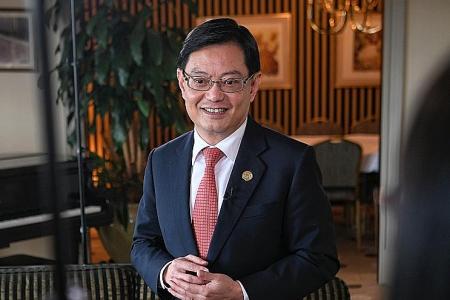Finance Minister Heng: Work at G20 included preparing for downturn
Ministers concerned about short-term global risk, financial resilience and support structures
Finance ministers from the world's 20 largest economies were concerned about the state of financial markets this year, and some of their work at the Group of 20 summit over the weekend focused on preparing for the eventuality of a downturn, said Finance Minister Heng Swee Keat.
"We have had a prolonged period of economic upturn. The question is, when is the downturn coming? And how do we prepare for that?" said Mr Heng in an interview on Saturday after the summit in Argentina, which he attended.
Singapore was invited as chairman of Asean this year.
His comments harked back to the raison d'etre of the G-20 summit: It was born 10 years ago when leaders came together in an effort to prevent a worsening of the global financial crisis.
Mr Heng said the ministers focused on three areas, the first being short-term risk in the global financial system.
Apart from the risk of a downturn, Mr Heng said current trade tensions are also creating more uncertainty.
"We need to be prepared for corrections in the market. We need to look at what we need to do to work together," he said.
SAFETY NETS
The second area of focus was on building a more resilient financial system with "safety nets" on a national, regional and global scale.
"Now, after the global financial crisis, a lot of work has gone on to improve financial regulation and financial supervision but there's still much more to be done," he said.
At the national level, leaders discussed how countries must ensure that there are no significant mismatches in borrowing and repaying loans.
They also tackled how to take care of the interest rate changes and possible currency fluctuations that could create problems, particularly for emerging economies, he added.
At the regional level, countries also looked at ways to enhance collaboration.
Mr Heng cited the safety net among Asean Plus Three members - Asean's 10 countries, plus China, Japan and South Korea - called the Chiang Mai Initiative Multilateralisation.
It mobilises members' foreign reserves to assist members that face temporary financing problems in their balance of payments, and has a current size of US$240 billion (S$329 billion).
Mr Heng noted that Asean Plus Three finance ministers had very good discussions earlier this year on how to strengthen this programme, and on how they need to work together with the International Monetary Fund.
The third area listed by Mr Heng was developing the financial system to support structural changes in various economies.
He cited two key areas finance could be channelled into: Infrastructure - including dealing with climate change - and education to prepare people for the changing nature of jobs.
Get The New Paper on your phone with the free TNP app. Download from the Apple App Store or Google Play Store now



